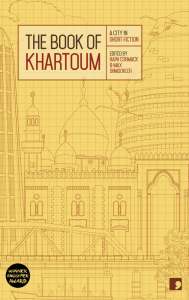Raph Cormack & Max Shmookler, editors
Comma Press, 2016
72 pages
Somewhere on a book blog I saw a reference to this book, a slim volume of short stories circling about the city of Khartoum, capital of Sudan. I've been trying to read more literature in translation, and I don't think I've read anything from North Africa, so I requested this from the library.
Khartoum, according to one theory, takes its name from the Beja word hartooma, meaning ‘meeting place’. Geographically, culturally and historically, the Sudanese capital is certainly that: a meeting place of the Blue and White Niles, a confluence of Arabic and African histories, and a destination point for countless refugees displaced by Sudan’s long, troubled history of forced migration.
The Book of Khartoum provides an intimate tour of this city through the eyes of 10 of its best authors, representing a wide array of literary schools and political stances; from the social realism of old Communist stalwarts, to the fantastical abstraction of a new generation of Sudanese writers.
-- Comma Press
Some of the stories are interesting tales of life in this African city today, while others are very experimental and hard to really understand. My favorite of the 10 stories is "The Tank" by Ahmed al-Malik. In it the narrator buys a used tank from a middleman he meets at a wedding. The reactions to the tank are telling of the society he lives in. His friends and neighbors are suspicious and stay away from him. The tradesman he deals with suddenly give him much better goods and services.
I also enjoyed "Next Eid" by Bawadir Bashir. In it Uthman is a young man from a small village who studies at a big university in Khartoum. Every Eid holiday he takes many gifts home for his family and friends. There he is considered a wonderful and talented big shot, called Sir Doctor Uthman. Afterwards he returns to his shabby dorm, his studies, and the night job that lets him support his family. A small, moving portrait.
According to the introduction, some of the stories depend on nuances of Arabic or playing with Arabic rhyming schemes. I am glad I read this little book, but it does demonstrate that literature in translation can be tricky to understand out of its context.
FURTHER READING
The publisher, Comma Press of Manchester, England, has a series called "Reading the City: Celebrating the best short stories from cities in the UK and from around the world." They are a bit hard to find, but I would like to read a few more. The series thus far:
The Book of Birmingham (UK)
The Book of Cairo (Egypt)
The Book of Dhaka (Bangladesh)
The Book of Gaza (Palestine)
The Book of Havana (Cuba)
The Book of Istanbul (Turkey)
The Book of Khartoum (Sudan)
The Book of Leeds (UK)
The Book of Riga (Latvia)
The Book of Rio (Brazil)
The Book of Tbilisi (Georgia)
The Book of Tehran (Iran)
The Book of Tokyo (Japan)




That seems like a really interesting series. I'll have to keep an eye out for them.
ReplyDeleteIt was very thought provoking. As a British import it's a bit hard to find, but I'm trying to read several more of them. I hope you locate some and review them!
ReplyDelete